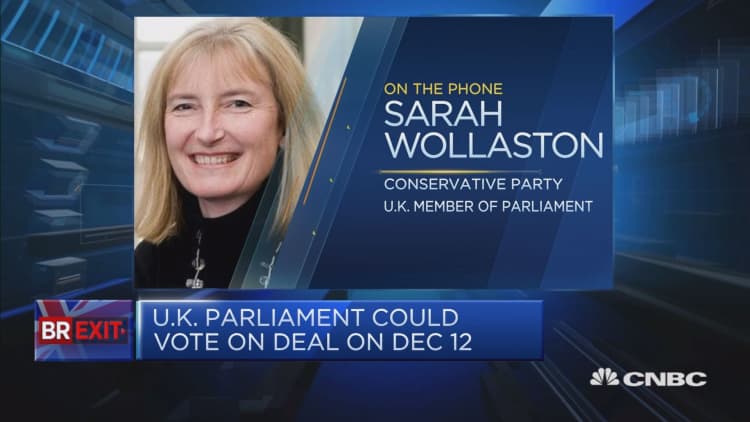
It is not "remotely possible" that U.K. Prime Minister Theresa May's Brexit withdrawal agreement would pass the House of Commons, which is the lower house of Parliament, in a crucial vote that will likely take place in December, a member of Parliament said on Monday.
Lawmakers on both sides of the debate over the United Kingdom's future as part of the European Union are unhappy with the proposals set by May in a 585-page, legally-binding document that lays out the terms of the former's exit, Sarah Wollaston, who is also a member of the prime minister's Conservative party, told CNBC's "Squawk Box."
"I just don't think it's remotely possible that this deal would pass the Commons," she said, adding that it will likely fall short on the numbers needed to move the agreement forward. "That doesn't necessarily mean that we would crash out with no deal because, certainly, Parliament, British parliamentarians are very opposed to leaving with no deal at all."
We're saying to Mrs. May, 'You must take this back in a second vote and we won't support it unless you have got valid consent from the public.' I certainly won't support it unless Mrs. May agrees to a second referendum and I think that there are many colleagues who feel the same.Sarah WollastonUK Member of Parliament
Wollaston, who voted to remain in the EU during the 2016 referendum, said the current agreement failed to adequately address the future relationship between the U.K. and Europe. Rather, the deal addresses issues such as citizens' rights, a £39 billion ($50 billion) "divorce bill," and a backup plan for the Irish border if upcoming trade talks stall.
"The problem is also with the future framework, which only runs to 26 pages. For me, that's the worst thing about it, is that you've got what amounts to little more than a wish list of things that they would like to negotiate in the future," she said, adding that it wouldn't settle the question, or the divisiveness, of Brexit anytime soon. "You could call it blind Brexit."
May sees 'brighter future'
For her part, the prime minister appealed to the British public in a letter calling for support of her plan, promising a "brighter future" for the U.K.
Tweet: PM @theresa_may's letter to the nation #BackThe BrexitDeal
"It will be a deal that is in our national interest — one that works for our whole country and all of our people, whether you voted 'Leave' or 'Remain'," she said in the letter. "It will honor the result of the referendum."
The European Union has also encouraged Parliament to back May.
Apart from the sparsity of detail about the future, Wollaston explained that Brexit would break up decades of close ties with the EU that would affect the U.K.'s health service, science and research, and social care.
She added that several lawmakers, including herself, are now telling May that she must put the Brexit agreement up for a second referendum vote so that the public can decide between accepting the deal as it stands, or opt to remain as part of the EU.
"We're saying to Mrs. May, 'You must take this back in a second vote and we won't support it unless you have got valid consent from the public.' I certainly won't support it unless Mrs. May agrees to a second referendum, and I think that there are many colleagues who feel the same," Wollaston said.
Showdown with Parliament
On Sunday, EU leaders gathered in Brussels and officially endorsed May's plan on how the U.K. will leave the bloc in March of next year. Now, the prime minister will face a largely hostile Parliament in her own country that will vote on the deal, likely next month.
May needs a simple majority of the 650 lawmakers in the House of Commons, but experts have indicated it will be an uphill task for the prime minister. Her Conservative Party holds 315 seats and represents the largest party in the House, but a significant number are against the plan, including some pro-Brexit members. Meanwhile, lawmakers in the opposition have mostly indicated that they will vote against the deal.
British media also reported that Scotland's first minister, Nicola Sturgeon, as well as Labour Party leader Jeremy Corbyn, have challenged May to a debate over her Brexit agreement before it is voted on by the Parliament.
Market reaction
The British pound is expected to remain volatile and under pressure in the weeks leading up to the vote in the House of Commons.
On Monday morning, the pound traded at $1.2799, declining from levels above $1.2900 reached in the previous week. Analysts pointed out that the currency has been consolidating between 1.27 and 1.33 since a government white paper was published in July, outlining plans for Brexit.
"The odds for a No Deal Brexit are set to push (the pound) into a lower 1.20-1.25 trading range ahead of the March 2019 deadline," strategists from DBS Group Research said in a note.
— CNBC's Matt Clinch contributed to this report.


